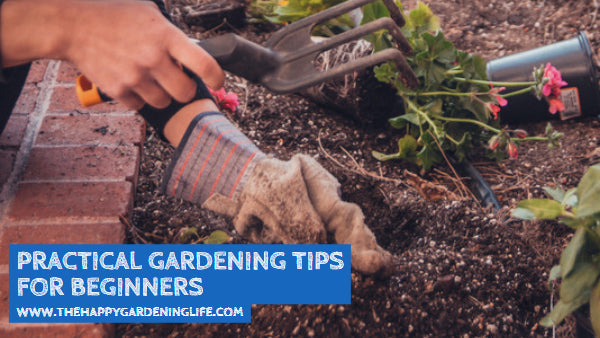
Practical Gardening Tips for Beginners
Share
 New to gardening? It can feel overwhelming at first especially when you don’t know where to start. But gardening isn’t really that complicated; you just need to take it step by step and start from the very beginning.
New to gardening? It can feel overwhelming at first especially when you don’t know where to start. But gardening isn’t really that complicated; you just need to take it step by step and start from the very beginning.
With constant practice and true passion for this hobby, you will surely become a pro gardener in no time! So go ahead and apply these beginner gardening tips below to help set you on the right track.
Watering Plants
- During dry or windy weather conditions, water your plants at least once daily.
- Water early morning or late afternoon to keep the water from evaporating too quickly.
- If you notice a wilting plant, be sure to water it right away.
- Never water a plant while in direct sunlight because that can cause scorching on the leaves.
- If you’re going on a trip and will not be able to water your plants regularly, move your potted plants to a shaded area to prevent wilting.
- For newly planted seeds, remember to moisten the soil instead of soaking it with water. Also water them lightly but in a regular fashion.
- Whenever you boil vegetables, make sure to keep the water you used afterwards because they’re very good for watering potted plants.
- Don’t forget that certain types of plants have certain requirements. For instance, the Devil’s Ivy needs to be watered twice daily, while the cactus needs water just once in every two days.
Exposure to Sunlight
- The ideal spot for a garden is an area that receives at least six hours of sunlight.
- It’s also critical to know what types of plants need more sunlight or shade so you can properly choose what to plant on your new garden. Some plants such as the African Violet and the Devil’s Ivy require more exposure to the sun, while others like the Lily-of-the-Valley and Forsythia thrive even when under the shade.
Other Useful Gardening Tips
- Got some used coffee grounds and tea? Well, don’t just throw them away! Excess tea and coffee grounds can provide more acidity in the soil, which is good if you have acid-loving plants like hydrangeas and daffodils. Simply sprinkle 1/4 of an inch on the soil once monthly and you’re good to go!
- Banana peelings are also an inexpensive substitute for commercial fertilizer.
- Plastic pots work better for indoor plants because they can prevent the growth of fungi on the pot and keep your place clean.
- Want to prolong the shelf life of your seeds? Put the seeds in a zip-lock bag and then put the bag inside an airtight jars. Make sure to keep the jars in a cold, dark location away from heat and sunlight as they can seriously damage your seeds. Lastly, don’t forget to label your seeds properly (include the seed variety and date of storage) so you can easily organize them. Download our FREE Planting & Storing Guide for more information.
- Before planting in a pot, put a paper coffee filter at the bottom of the pot first to keep the soil from falling out.
- Remember that not all insects are harmful. Ladybugs, earthworms and ants can actually be very beneficial for the success of your garden.
- Instead of using artificial pesticides, consider adding companion plants in your garden. Companion plants such as marigolds are great insect repellents and a much safer alternative. CLICK HERE for a basic list of the best companion plants.
So those are the top beginner gardening tips that every new gardener should know. Always keep them in mind so you can have the easiest and most wonderful time gardening at home.
Feel free to download our Planting & Storing PDF Guide to kickstart your gardening journey!
